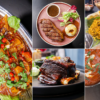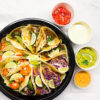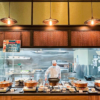This article is made possible by halalfoodhunt. Support us by downloading our halalfoodhunt app and subscribing to our FRIENDS Loyalty Pass so that we can keep this site running and benefitting our halal community.
This has happened at least once to all of us at some point. We walk into a cafe that has been rumoured to be Muslim-Owned. What we heard was probably true. But when we look around, what do we really see?
We see non-muslim staff. We see the design and layout of the cafe resembling that of a bar. Sometimes, the cafe itself has items on the menu with fine print stating *contains alcohol*. Or worse still, we realise that there’s a bar connected to the cafe, selling all the beverages that we know we shouldn’t be consuming.
A quick question to the staff goes like this:-
Qn: “Is the food halal?” Ans: “We are Muslim-Owned”
Or.
Qn: “Is the food halal?” Ans: “Our meat is from a halal supplier”
So, muslim-owned = halal? halal meat supplier = entirely halal food? Not exactly.
The halal certification process
To understand the difference, we first have to understand what goes on behind and before an eating establishment / food product attains its halal certification. Every country has its own set of processes, but in general, when broadly summarised, there are 2 major steps.
Step 1: Verification of the ingredients
When an application first comes in, it will involve the certifier looking at a list of ingredients used in the production of that food product. In the case of restaurants, this would involve the restaurant submitting its entire menu along with all the list of ingredients that it uses for the making of the items on the menu. For Singapore’s MUIS certifications, this would also involve each restaurant keeping track of who its suppliers are, and for some cases, requires the restaurant to hang on to the halal certificates of all the products from its suppliers (and all the other paperwork that comes with it).
This list of ingredients can involve simple raw materials like sugar, or wheat. But a lot of the time and especially for pre-packed and processed halal products, this involves the uncommon names of proteins and chemical compounds. Try memorising emulsifier codes and flavouring codes to get a feel of how complicated these processes can get.
With technological advancements in food manufacturing, ingredients are not so simple any more. While working in the halal certifications scene previously, I was trained to be able to decide if this compound warrants further investigations with just one look at the name of the compound, before I forward the application to my superiors. Trust me, having a chemistry degree really helped.
Halal certifying bodies normally have their own database of codes and complicated chemical names of products along with the statuses of “halal” or “haram” or “doubtful” for their own references. They then use their database to decide whether or not to grant the halal status to certain products.
Step 2: The Production Process
Part of the certification process involves the certifier to visit the production plant to ascertain that there are no additional or dubious products involved in the production. At this juncture, I would like to highlight the level of strictness in halal would also depend on the country / mufti / madzhab that you are in. In some madzhabs, only the ingredients matter, production process doesn’t matter. For other mazhabs, like mine, it matters a whole lot.
So when you want to choose a halal logo to trust, it would be better to trust the one that is originating from your own country / mazhab as they would best understand that level of strictness.
So let’s say the application passes step 1, and it is found that no doubtful or non-halal ingredients are used, the application now goes to step 2, where the certifier visits the production plant. In the case of an abattoir, halal auditors will look at who is the person doing the cutting. In the case of the production of cheese, or butter, sweets, or packaged products, they will inspect the machines used. Alarms would be raised if auditors find anything doubtful.
At this juncture, let me give a sneak peek as to what halal auditors have seen before, just to illustrate how serious this step is. For instance, in the production of sweets, the sugar will be spun at high velocity in hollow machines to increase the concentration of the sugar. Usually to ensure that the sugar crystals don’t stick to the walls of these hollow machines, its walls are actually lined with lard (pig fat). Another example is when part of the food production process requires straining or a separation of liquids from a solid. Since pig intestines have been found to have the finest pores that provide the best filtration results and produces a higher quality product, the use of these filters will have to be checked.
So perhaps, just ask yourself if you would be comfortable with eating butter that has been strained using a filter that’s made of pig intestines. When you’ve answered this question for yourself, then you would understand where I’m coming from when I say it’s really important to choose halal certified products over others. Even though halal standards differ slightly from country to country, it does give me a little peace of mind if I knew that another muslim has already looked at the production process of a certain product before I consume it.
Here’s a little teaser of where other pig parts can be found..
[youtube=://www.youtube.com/watch?v=BRETz2F-heQ&w=854&h=480]The muslim-owned product / eating place
So is there really difference when a product is halal certified vs the entire place is 100% muslim-owned? Well, yes there is.
Firstly, a muslim-owned enterprise hasn’t necessarily undergone the rigorous and stringent process of halal certification. The auditors involved in halal certification will painstakingly check the halal status of every single ingredient used in the food production kitchen, including meat supplies, sauces used, as well as check if there are any possibilities or threats of halal food production being contaminated with non-halal ingredients. Auditors are bound by standards set by their organisations, which are knowledgeable in halal matters. For a muslim-owned establishment, the halal status of the food is entirely in the hands of the muslim owner.
Sadly, in our adventures with halalfoodhunt.com, we have found some 100% muslim-owned establishments to be selling alcohol, and involved in the sale of non-halal dishes, even though they purchase meat from halal suppliers. Without highly alert muslim chefs, managers and owners, or auditors to do thorough spot checks on eating establishments, we won’t really know what’s happening in the kitchen before our food is served to us. For such establishments mentioned, then I suppose 100% muslim-owned does not mean that the food served is halal.
On another note, let’s think well of our muslim brothers and sisters, and recognise that likely, they would not intentionally sell non-halal food. Then, at this point, the food served will be entirely dependent on how well our own muslim brothers and sisters understand what is halal. For our muslim sellers, if you’re not sure about any products that you’re using, just drop us an e-mail! And, if we don’t have the answer, we will refer you to someone who does.
By and large, for the most cases where our practising muslim sellers purchase only halal food and from halal suppliers, and are well informed of the halal risks factors, then it is completely fine. In my adventures with halalfoodhunt.com while meeting with restaurant owners who want us to run marketing campaigns for them, I get very heartened when the restaurant owners themselves talk passionately to us about the subject of halal. They will tell us where their cheese comes from, and its halal supplier. Sometimes, they are the ones that give us warnings. One conversation with a Moroccan chef that I particularly remember went like this – “Sometimes they add wine in (this moroccan dish) to appeal to the non-muslim crowd, so you muslim, don’t eat. And cheese, if you want good halal cheese, tell me, I will give you my supplier, don’t buy from the non-halal ones from outside, you know what it contains, right?” Ah! the relief when the chef himself is well aware of halal matters.
But sadly, we have also found doubtful products being sold at other 100% muslim-owned establishments while doing our halal food hunts – perhaps they didn’t know. Sometimes, we ourselves don’t know that the item that we are purchasing isn’t halal. We don’t spend every day reading about halal products and ingredients, so how would we know if a certain emulsifier E472 used in the colouring of the cake that we bought at the cafe down the street served to us by a hijab lady, contained porcine derivatives. Really, how would we know?
Truth is, we don’t – not unless we get ourselves educated. Halal-educated sellers will be better equipped to ensure the halal status of the food items that they serve, and halal-educated buyers will in turn become more discerning in their purchasing habits.
So is it necessary that a muslim-owned establishment gets the halal certification?
Getting the halal certificate is entirely voluntary, and it comes with a whole set of requirements. So if these requirements put a strain on your muslim-owned business, then I suppose your next option is to ensure that you are well-educated in the areas pertaining halal, so that you are able to make better decisions regarding your food suppliers on behalf of your muslim consumers.
There are things that we take for granted, or perhaps we didn’t know was not halal, until we actually read an article, went for a class, or listened to talks, or attended a seminar discussing halal issues. This is where halalfoodhunt.com will do our part to improving the halal literacy in our community. Stay connected with us, read and share our articles while we work out some plans to improve this area of our community. Sign up for our newsletters, keep updated & we promise you won’t be disappointed.
I hope this article has shed some light to the differences in halal-certified establishments and 100% muslim-owned establishments. The intention of this article is to allow its readers to be more discerning in their food choices. In no way do we intend to brush all 100% muslim owned establishments with the same brush, but we feel that there’s a need to inform our readers of anomalies that we found, so that everyone is more aware, and is able to make better (halal) choices. On our part, halalfoodhunt.com also lists 100% muslim-owned establishments. The difference? Each and every of the establishments that lists with us involves the owner declaring that s/he will take responsibility over the halal status of the food that they serve – so as consumers, we also have a peace of mind.
PS: If you are a muslim owner of a restaurant that is not halal-certified, and you’re keen to learn about halal risk factors so that your restaurant is better equipped at choosing halal ingredients and suppliers, drop us an e-mail at hello@halalfoodhunt.com. After sharing with you all the information that you need to know, we’ll even list you on our halal food listings, and give you our logo decal for your restaurant so that our followers will be able to find you, and patronise from you! 🙂
Always remember – Halal first, everything else later!
—halalfoodhunt.com is THE hunting ground for you to scout for halal food places in Singapore, make reservations at restaurants, as well as to get your latest cravings delivered to you. Be handsomely rewarded for choosing halal when you take it one step further by being our FRIEND. Check us out at halalfoodhunt.com!



